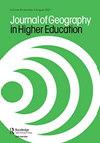为了共同利益的地理学
IF 1
4区 教育学
Q2 EDUCATION & EDUCATIONAL RESEARCH
引用次数: 0
摘要
共同利益的概念是地理学中许多政策制定的基础。评估地理对大学课程共同利益的影响有两个原因。首先,通过在影响政策的各种理论范式中工作,学生将学会从不同的角度进行辩论,如社会民主主义或新自由主义。其次,要求他们评估政策在满足共同利益方面的有效性,可以培养出具有批判性思维和解决问题能力的就业毕业生。这一点尤其正确,因为概念通常没有完全发展,并且随着每个视角的不同而变化。最初,学生们对一个地区进行案例研究,使他们能够在所有的历史曲折中遵循干预的逻辑。在进一步的阶段,学生们不仅在不同的理论框架内争论,而且在不同的理论框架之间争论,比较各种方法,以发现最适合理解当地过程和追求共同利益的方法。在最后阶段,学生调查知识政治,再次使用来自同一地区的数据,研究地理政策制定中使用的知识如何通过被社会主导范式吸收而成为社会经济变革的代理人。本文章由计算机程序翻译,如有差异,请以英文原文为准。
A geography for the common good
ABSTRACT The notion of the common good underlies much policy making in geography. There are two reasons for evaluating geography’s impact on the common good for the university curriculum. First, by working within the various theoretical paradigms that have influenced policy, students will learn to argue from different perspectives such as social democracy or neo-liberalism. Second, asking them to assess the effectiveness of policies in meeting the common good, produces employable graduates with skills in critical thinking and problem solving. This is especially true because the concept is often not fully developed and varies with each perspective. Initially students undertake a case study of an area that allows them to follow the logic of intervention during all its historical twists and turns. A further stage sees students arguing not just within but between different theoretical frameworks, comparing the various approaches in order to discover the most appropriate one for understanding the processes in the locality and for pursuing the common good. In the final stage students investigate the politics of knowledge, again using data from the same locality, looking at how the knowledge used in geographic policy making becomes an agent of socio-economic change through being absorbed by society’s dominant paradigm.
求助全文
通过发布文献求助,成功后即可免费获取论文全文。
去求助
来源期刊

Journal of Geography in Higher Education
Multiple-
CiteScore
5.80
自引率
9.50%
发文量
29
期刊介绍:
The Journal of Geography in Higher Education ( JGHE) was founded upon the conviction that the development of learning and teaching was vitally important to higher education. It is committed to promote, enhance and share geography learning and teaching in all institutions of higher education throughout the world, and provides a forum for geographers and others, regardless of their specialisms, to discuss common educational interests, to present the results of educational research, and to advocate new ideas.
 求助内容:
求助内容: 应助结果提醒方式:
应助结果提醒方式:


